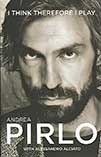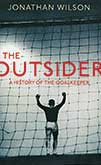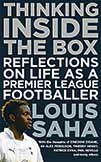 by Andrea Pirlo with Alessandro Alciato
by Andrea Pirlo with Alessandro Alciato
BackPage Press, £9.99
Reviewed by Joyce Woolridge
From WSC 329 July 2014
Reading this autobiography of a playmaker nicknamed “Mozart” is like going to the opera: some bloke comes on and sings very loudly in Italian at you for a couple of hours, it’s all very dramatic and enjoyable, but you don’t always know quite what’s going on. In no discernible order, its voluble and intelligent subject, who “has an opinion about everything and I’m not ashamed to express it”, launches into an erratic, extended and idiosyncratic monologue. There are even (mostly much needed) footnotes to explain some of the passing references, although glossing ultras as “the self-styled, most passionate, vocal and committed supporters” was probably unnecessary.
Many of Andrea Pirlo’s lines do sound as if they could have come from, say, Don Giovanni. When his ten years with AC Milan end with the gift of a pen (how many domestic footballers are presented with something to write with when shown the door?) he declares: “Still, I raised a smile because I know how to laugh, long and loud.” (Cue ear-splitting Rabelaisian guffaws.) Various club presidents and managers memorably strut the stage. Marcello Lippi theatrically denounces the Italian dressing room: “Bunch of bastards, bunch of spies”; Antonio Conte hurls water bottles at Juve bellowing: “It’s time we stopped being crap.”
The reader is never in doubt that the text was originally in Italian, making it refreshingly different from the prosaic platitudes of the standard British footballer’s life. True, the highly charged style occasionally strays into Swiss Toni territory: “When you’re in love, it’s time you need. When the feeling’s gone, having an excuse can help.” Again, no British footballer could ever get away with statements such as Pirlo’s lament after Alex Ferguson “unleashes” the ferocious Park Ji-Sung to shadow the Italian midfielder in a Champions League tie: “He’s essentially a man without blemish, but he ruined that purity just for a moment… a fleeting shabbiness came over the legend that night.”
However, usually the purple prose fits the subject matter perfectly. Pirlo’s visceral reaction to losing the 2005 Champions League final in Istanbul will delight not only Liverpool supporters. Not for him the mealy mouthed “gutted”. After this “mass suicide where we all jumped off the Bosphorus Bridge… I no longer felt like a player… But even worse, I no longer felt like a man.” Walking up to take the first penalty in the 2006 World Cup final shootout is “barely 50 metres. But it’s a truly terrible journey, right through the heart of your fear.”
Certain footballers’ preoccupations transcend nationalities. Pirlo’s favourite pursuits, we learn, at some length, are mickey-taking, PlayStation (“after the wheel, the best invention of all time”) and wine, albeit from his father’s vineyards. With a grand flourish he turns down €40 million (£32m) to join Qatar’s Al-Sadd, preferring instead one last bow for his country in the 2014 World Cup. As he says earlier: “Take someone like Antonio Cassano. He says he’s slept with 700 women in his time, but he doesn’t get picked for Italy any more. Deep down, can he really be happy?”
 A History of the Goalkeeper
A History of the Goalkeeper Reflections on life as a Premier League footballer
Reflections on life as a Premier League footballer
